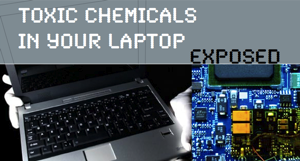





In Greenpeace Apologizes For Apple Stink, I reported on Toxic Chemicals in Your Laptop Exposed, a new report which labored to find any trace of chemicals, toxic or not. The report not only wholly contradicted the group's earlier Guide to Greener Electronics, but its sensationalist press release also contradicted the data in the report itself! Why is Greenpeace shooting in such random directions?



The basic problems in the Guide, which I originally critiqued in Top Secret: Greenpeace Report Misleading and Incompetent, were sidestepped in a rebuttal from Tom Dowdall of Greenpeace International, but the followup laptop lab test report seemed to indicate a new direction for Greenpeace: an interest in accuracy.
Picking up the Pieces
Stephen Russell, a materials consultant to the IT sector, explained that the complete disconnect between what Greenpeace reported in their Guide and what they actually found in their lab tests “proves three things:
-
•that the criteria used by Greenpeace to award HP pole position in last month's Guide to Greener Electronics clearly didn't account for what is actually happening on the ground today.
-
•that other manufacturers' computers really don't contain toxic chemicals in concentrations that are of concern.
-
•that Greenpeace has an inexhaustible level of funds to burn on a chemical campaign the basic chemical principles of which they sadly don't appear to understand.”
Poison Apples?
Unfortunately, Greenpeace ignored their own very expensive lab reports to instead retreat back into sensationalism, fear mongering, and deception. The top story on Greenpeace International's press release blog is an entry titled "HP and Apple's toxic laptops exposed" which states:
"Some of the best-known laptops are contaminated with some of the worst toxic chemicals. Of the five top brands we tested Hewlett-Packard and Apple laptops showed the worst contamination levels."
After reporting that the testing found traces of chemicals in HP's laptop which HP's website "claims it removed from its products years ago," the press release then jumps on Apple. Under the headline Poison Apples, it claims:
"Apple has recently launched its new range of MacBooks, but what you also get with a new MacBook is the highest level of another type of toxic flame retardant, tetrabromobisphenol A. Apple claims it is looking for alternatives but for now it appears to be using far more of this toxic chemical than its competitors."
The Apple and the Environment website does claim Apple "is actively researching materials with better environmental features to replace tetrabromobisphenol A (TBBA)," and that "Many Apple products have enclosures made of inherently flame retardant aluminum and polycarbonate plastic, reducing the need for added flame retardants."
Under Attack
But is TBBA really one 'of the worst toxic chemicals,' and is true that "Apple's laptop shows the worst contamination levels?" Was Greenpeace lying in its press release?
Yes, Greenpeace lied to sensationalize a report it spent a lot of money on, but which didn't provide data the group wanted to hear. While the group’s earlier press releases and information was mostly just incompetent and sloppy, the latest ‘poison Apple’ campaign was simply a malicious attack based upon lies.
Super Trooper
While making a big stink about TBBA and its supposed toxicity to create fear and panic, resulting in donations, Greenpeace ignored the opinion of the scientific community.
"agrees with the conclusion that there are no concerns for the carcinogenicity of tetrabromobisphenol A and supports conclusions ii) for all exposure scenarios since the Margin of Safety (MOS) are very large. Due to low systemic biovailability and efficient conjugation of the phenolic groups in tetrabromobisphenol A (TBBPA), bioaccumulation of this compound is not considered to be of concern."
In EU Risk Assessments, a "conclusion ii)" means that there is no need for further information or testing and no need for risk reduction measures. That's why TBBA isn't even regulated under the strict RoHS guidelines. Greenpeace knows this, but this fact does not fit into their fear mongering campaign.
Mamma Mia
Greenpeace was criticized last year for mounting a 'hysterical, scaremongering' campaign about dangerous chemicals in the environment by Prof. Alan Boobis, a Professor of Biochemical Pharmacology and director of the Department of Health Toxicology Unit at Imperial College London.
In reality, TBBA isn't a toxic blob of ooze hiding inside laptops, but a rather a chemical applied to certain plastics as a fire barrier. The nature of TBBA limits any credible risk to health:
"The plastics used in TV and computer housings are hard and dense so that substances used in their construction have little opportunity to be released. [Fire Retardants] have essentially no tendency to move from the solid state into a gas form, and thus are unlikely to be released into the air around the computer or TV. Monitoring studies have confirmed that TVs and computers are not significant emission sources."
Kisses of Fire
Greenpeace is purposefully deceiving the public in an effort to gain notoriety and donations. Not only is the group quick to lie about toxicity, but it also incompetently fails to account for why chemicals such as TBBA are in use in the first place.
The group's flamboyant press release refers to TBBA is one of the "worst toxic chemicals," but ignores the real safety issue that TBBA addresses: hundreds of deaths are prevented by flame retardants every year.
The Environmental Protection Agency's Voluntary Children’s Chemical Evaluation Program reports that "at a minimum, an estimated 280 deaths are avoided in the U.S. every year because of the use of brominated flame retardants."
"Flame retardants can reduce the risk of death or injury in fires by preventing or delaying ignition, reducing the rate that fire releases heat, reducing the quantity of toxic gases produced, and increasing the time available to leave the burning building. Studies have shown that flame retardants can increase the time available to escape a burning building by a factor of 15."
In trying to spread panic in subjects it fails to understand, Greenpeace ignores public safely issues in order to sound like an expert worthy of consumers’ donations.
Name of the Game
Greenpeace wants your money, and it's ready to say anything that will get you to hand it over. Here's a look at the response Greenpeace sent a member who asked the group about earlier criticisms of the Greener Guide to Electronics. Note that Greenpeace has no problem with saying things that are not at all true.
He had three main thrusts to his argument (that I could discern):
1. Greenpeace's study is based on published claims about their practices, and not actual testing of their products.
My response: The report was based largely on the companies stated policies. Stated policies are critical to holding companies accountable for the environmental stewardship. Apple has a very poor environmental policy when compared to other companies. Simple enough.
2. Greenpeace has no credibility because of 2 events: The Brent spar action OVER 10 YEARS AGO, and the Rainbow Warrior running aground on a reef due to inaccurate navigational charts.
My response: These two events are in no way related to Greenpeace's current credibility. The Greenpeace toxics team is actually very well respected internationally both by professionals in the chemicals industry, and by policymakers in the United States, Europe, and those who work on international agreements. Furthermore, all of our science is vetted through our Science Unit, which is based at the very respectable Exeter University in the UK.
3. Apple isn't that bad because it doesn't sell nearly as many computers, and therefore pollutes only a fraction of the larger computer makers (such as HP).
My response: This study was a qualitative assessment of one aspect of corporate environmental citizenship - not a quantitative assessment. Macs make up less than 10% of computers worldwide. They shouldn't get a pass to produce some of the most toxic computers in the world simply because their production volume is relatively small. They have the same ethical responsibility as all the other computer manufacturers.
Why You Shouldn't Support Greenpeace
The three ideas Greenpeace addressed aren't really the main points I wrote about, but it's interesting Greenpeace chose them as examples.
In the first case, the Greenpeace Guide advertised a high ranking for HP, but their actual lab tests found that the HP laptop Greenpeace bought and tested didn't meet HP's own goals and promises. That means the Guide, which was heavily touted as a report card reflecting companies' practices, not promises, was really just worthless; two weeks later Greenpeace had to retract all the PR. One can't really retract sensationalist PR.
Did consumers benefit from being told a simplistic story about HP being "a green leader" two weeks ago, and did Greenpeace send a useful message by ranking down HP in its report this week? Or did both simply serve to muddy the waters by ranking huge companies on a series of subjective criteria that didn't reflect their actual actions?
In this email, Greenpeace claimed Apple "has a very poor environmental policy," but he facts are that Apple is recognized as a leader in environmental policy by the Sierra Club, and that Greenpeace was unable to find any lapses in Apple's products even after buying several in an attempt to have something to report.
After finding nothing of consequence, Greenpeace had to lie about their findings, and reported a negative spin about Apple that used clever word play, but was entirely deceiving.
The point: Greenpeace has no interest in presenting facts or reality in environmental issues. They spend a lot of money pushing reports that are not only inaccurate, but intentionally misleading.
The second point, concerning my references to the Brent Spar controversy and Greenpeace destroying protected coral reefs in an attempt to "save" them, were presented as examples of how Greenpeace (and anyone, really) can do more damage than good despite good intentions.
I didn't present them as reasons Greenpeace had no credibility, but rather examples of Greenpeace being sloppy with planning and facts, and subsequently ignoring its own mistakes in retrospect rather than taking responsibility for its errors.
The most recent report, "Toxics in Your Laptop Exposed," did credible scientific tests, but then threw out the data to instead present a lathered up, misleading and deceptive press release that was simply a lie. No amount of credible science is worth anything if you ignore the findings and simply present the message you wanted to the data to support.
If Greenpeace had Al Gore buy an Apple laptop, and a panel of Nobel laureates perform sophisticated testing, it still wouldn't change anything if Greenpeace subsequently discarded their findings to present the same fear mongering report and press release it planned from the start.
Third, while I pointed out that Greenpeace failed to account for the size, volume, and product mix of the companies they ranked, I never stated that Apple should be given a free pass on environmental issues due to its size.
What I actually pointed out was that the "most toxic computers in the world" are actually made by low cost leaders, in particular HP and Dell, who strive to make $299 disposable PCs that can be marketed by WalMart or online as loss leaders. These machines require CRT displays to reach that price target, making them hundreds of times more toxic and far more difficult to recycle properly. The low end consumer market is also the least likely to recycle. These are key facts Greenpeace ignored in its rebuttal and in its following reports.
If Greenpeace were at all interested in anything other than getting donations to maintain its status quo, it would challenge cheap PC dumpers on their efforts to shoot out disposable, garbage PCs that have a two year lifespan, not grandstand for the two biggest companies that produce the majority of the worlds cheap PCs while they vilify Apple.
In comparison, Apple makes PCs that are sold at a minimum price point that allows them to make sustainable machines that last longer. Apple can afford to do this because it is making enough money on premium machines to avoid participating in the high volume, low quality majority market.
Why should anyone continue to fund Greenpeace in their efforts to badmouth companies that contribute a tiny fraction of the world's PCs, while gushing about the promises (not kept) of the major PC makers, who contribute the most toxic and the vast majority of e-waste?
This Series

| | Comment Preview
 Read more about:
Read more about:

 Send |
Send |

 Subscribe |
Subscribe |
 Del.icio.us |
Del.icio.us |
 Digg |
Digg |
 Furl |
Furl |
 Reddit |
Reddit |
 Technorati
Technorati
Check out the Daily Show Multi-Pass on iTunes.com
Click one of the links above to display related articles on this page.
Greenpeace Lies About Apple
Saturday, September 23, 2006






Ad






